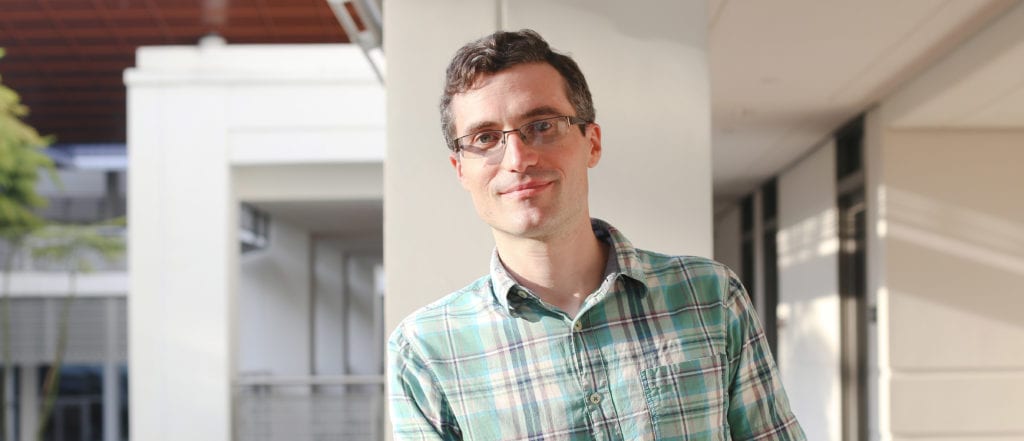Dr Stuart Strange on spirit mediumship and teaching Anthropology

Magic, mediums and mystics – themes found in the hit film Doctor Strange (2016) and in Yale-NUS College’s very own Dr Strange’s research and teaching. Like the film produced by Marvel Studios, Assistant Professor of Social Sciences (Anthropology) Stuart E Strange’s work explores issues around the material and the spiritual world. Unlike his namesake however, a fictional sorcerer who uses magic to transcend the material plane, Dr Strange studies the rituals of spirit mediumship as a way to understand cultures and social relations.
Dr Strange is a self-described political anthropologist who focuses on religion. He graduated from the University of Michigan in 2016 with a PhD in Anthropology and joined Yale-NUS College in the same year.
He has conducted fieldwork in Suriname, Sri Lanka, Ghana and Haiti, and is conversant in six languages. In Suriname, his comparative research on spirit mediumship focused on the observation and analysis of the rituals and the techniques used by spirit mediums to produce knowledge. This fieldwork has spawned journal articles, book chapters in edited volumes, and a book project. “My research on spirit mediumship has increasingly come to focus around questions of self-control and self-knowledge,” he shared.
His book project will explore these themes in detail. “My book is largely about self-knowledge, and I will be examining spirit mediumship and how it is successful to the degree that it challenges people’s sense of conviction that they know who they are.”
Dr Strange’s fieldwork and research provide a rich background for his teaching at Yale-NUS, where he conducts a module on Ethnography, drawing on his extensive fieldwork experiences to teach ethnographic methods. He has also taught a module on Religion, Ritual and Magic, and will be teaching a module on the Anthropology of Dreams and Sleep in the next academic year. The latter two modules overlap with his research interests in religion and its rituals. Thus, his research experiences have proved indispensable in providing his students with an in-depth education in Anthropology.
To encourage an understanding of Anthropology with as much breadth as depth, Dr Strange invites guest lecturers to speak to his classes in person or through Skype, by tapping on networks of friends who are fellow anthropologists. Some of these guest lecturers include a linguistic anthropologist who conducts fieldwork in the Andes and a Singaporean anthropologist conducting fieldwork in East Timor.
He shared many reasons for inviting guest lecturers to speak to his students. “These anthropologists work in very different ways, and such sessions introduce students to the different traditions and techniques of anthropology. Each of the guest lecturers provides a different sense about what is possible in ethnography. Ethnography is profoundly open, and it’s about learning how to be responsive specifically to the demands of others.”
In addition, bringing in guest lecturers helps to encourage students in their studies and research, and makes ethnographic research accessible.
As he explains, “When you’re trying to figure out what ethnography is, you often start by reading a completed ethnographic monograph, which is very daunting. Thus, particularly with teaching the Ethnography class, it’s often useful for the students hear from people who are further along in the task but are not totally finished with their projects – people who are still actively in the process of figuring it out themselves.”
His expertise on the anthropology of religion is also invaluable for seniors when they conduct their capstone projects. He is currently supervising two students working on capstone projects that explore religious phenomena in Singapore.
Dr Strange describes Singapore as a fascinating place, and a great fit for his research interests. “For the kinds of things I’m interested in, it’s kind of miraculous that I’m here”, he said warmly. He enthused about the rich diversity of religions and rituals in Singapore, including the temple and shrines on Kusu Island, the Thai amulet shops in Golden Mile Complex, Hindu festivals and Chinese spirit medium processions, all of which he has visited or observed here. His interest in Chinese religions and spirit mediums has led him to embark on research on Chinese spirit mediums in Singapore, conducting fieldwork by observing medium processions.
In this, he sees parallels across cultures in his comparative research on spirit mediumship.
“I’m really struck by how similar the practices are between spirit mediums from different cultures, particularly the Afro-Surinamese spirit mediums I worked with, and the Chinese spirit mediums here in Singapore, even though there is no historical connection between the two.”
This similarity, he explains, may stem from how spirit mediumship revolves around issues of self-control and self-knowledge. “It leads to really interesting issues relating to religion and politics, which has to do with questions around authority,” he explained.





